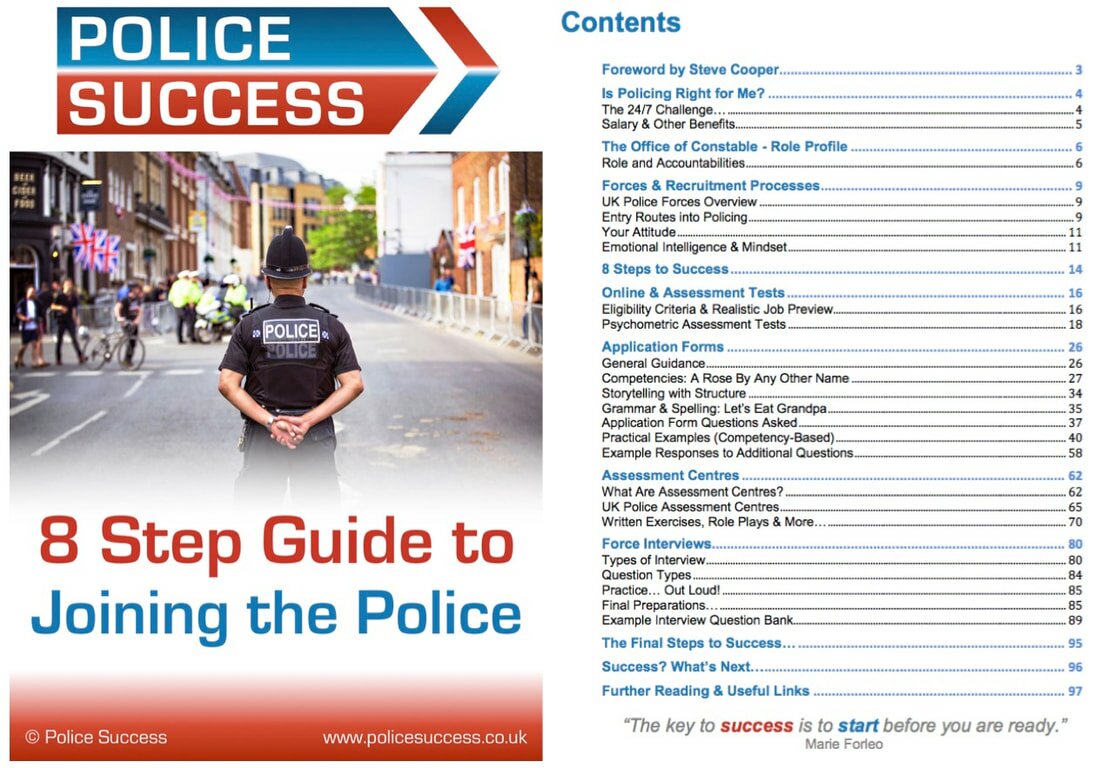Police Application Forms: Evidence & Examples
“What can be asserted without evidence can be dismissed without evidence.”
Christopher Hitchen
Having chosen to become a police officer, as part of the police recruitment process you will be expected to provide some supporting information about your life and work experiences. This will be assessed against the role and behaviours expected of police officers.
Police application forms contain set questions. Different police forces ask different questions on their recruiting forms, but all require specific information to assess against their policing competencies. For example, in England & Wales, evidence is often required to demonstrate behaviours such as Professionalism, Working with Others, Decision Making and Service Delivery. Whether your chosen force uses these or other behaviours of an effective police officer, it can be daunting to think about what evidence or examples you may have from your own experiences, then writing about it. The good news is that you almost certainly have what forces are looking for...
A key element when providing evidence or examples in a police recruitment application is that the information needs to be specific. That means being clear about what you did, how you did it and the result or outcome of your actions. You will be provided with detailed guidance by your force. That said, some forces are better than others. For example, some will ask extra questions to help you deliver a rounded example against any required behaviours.
Below is a summary of descriptors for the behaviour Working with Others. They are the guidelines describing ‘what good looks like’ for this particular behaviour. Note that these behaviours of 'an effective police officer' of course look similar wherever you apply in the UK. For example, Police Scotland describe similar traits under the 'Team Working' competency of their 'Personal Competency Descriptors'.
Police Application Example: Working With Others
“If you want to go fast, go alone. If you want to go far, go together.”
African Proverb
Use the behavioural descriptors to help align your own evidence, like shown above with 'working with others'. You don’t have to set your example against each descriptor, but the more closely you adhere to the guidance, the easier it will be for assessors (using the same descriptors) to score your evidence. This is particularly true when mirroring some of the language describing the behaviour.
Below is an example of the behaviour Working with Others aligned to the guidance. This example happens to relate to supporting a colleague with a new IT system. The main question comes first, then is followed up with additional questions used by some forces to help guide applicants towards providing a fuller response...
'Please describe a time you encouraged someone to view an issue more positively.'
Why was it necessary to encourage the person to view the issue more positively?
A new colleague was struggling to use a software system at work. It was important to respectfully encourage her, so that she wasn’t stressed and could work to her full potential. It was also important to encourage her because this was impacting on the team’s capability. How did you encourage the person to view the issue more positively? Once I had finished my tasks for the day, I offered to sit down with her and go through the system in detail. I took her through step by step, explaining with clear instructions and wrote these down in a note pad for her to refer back to. I reassured her as she improved and provided my mobile number. What did you consider when encouraging them to view the issue more positively? I considered that she might have felt embarrassed about being offered help, so I ensured my language was helpful and supportive. I considered working a little faster earlier on in the day to complete my own responsibilities to ensure that I had enough time to listen carefully to any issues raised and then provide assistance to her without being rushed. What was particularly good or effective about how you encouraged the person to view the issue more positively? Giving her my mobile number was effective as she was able to use the computer on her own with confidence, knowing that she could call me for guidance or support rather than worrying or not being able to progress. My ongoing reassurance through the week gave her more self-esteem and enabled her to start working independently on the new system. What difficulties did you experience and how did you overcome them? It was difficult to be able to help her whilst working in a busy work environment due to noise and distractions. I overcame this by suggesting we worked through our lunch breaks occasionally, as it was much quieter. I also found it difficult offering to help given my own workload but overcame this by managing and prioritising my time to fit the support sessions in. Insights: Compiling Your Police Application
“A moment's insight is sometimes worth a life's experience.”
Oliver Wendell Holmes Snr.
Reading through police application examples like this can trigger your thinking and support your approach towards drafting your own evidence. It gives you an idea of how you might shape and draft your own examples for police application forms. You can also pick up insights into what kind of situations or experiences might be suitable from your life and importantly what the end product can look like.
Breaking challenges down into smaller parts helps. With that in mind, you’ll see that the sub questions in the example provided act as supporting prompts to assist applicants in providing specific evidence. When examples are clearly structured and laid out as above, it aids assessors to do their job. They are interested in specific actions that you took, aligned to the behaviours being assessed. In that sense it’s time to blow your own trumpet! You will note in the example provided that “I” is used quite a lot, rather than “we”. The use of “I” clarifies which actions were performed by you. Using “I” is therefore good practice to help demonstrate the part you played in any example you provide. Supporting a colleague is a great example to demonstrate the behaviour ‘Working with Others'. It’s a behaviour which occurs across organisations whilst working in teams or on projects. Further Support...
I hope you found this blog helpful. If you are thinking of applying to join the police service, good luck and I wish you all the very best.
For many more police application form examples, plus a raft of other guidance on joining the police service, why not download our digital '8 Steps to Success' toolkit.
Kind Regards,
Steve
0 Comments
Your comment will be posted after it is approved.
Leave a Reply. |
 RSS Feed RSS Feed
AuthorA former Royal Marine, Detective Inspector, and is a qualified coach/mentor. With extensive police experience, Steve also established Rank Success to help officers achieve police promotion. CategoriesAll ArchivesFebruary 2021 |







